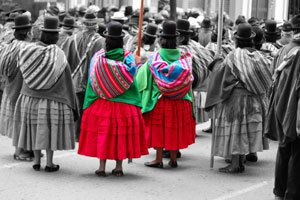
Evo Morales, May 2006. Photo CC: Alain Bacheliier.
They all yield to it in the end, it seems: powerful presidents see their time in office coming to a close, and they think, why not change the constitution and have another four years or five? Bolivia’s Evo Morales-leftist, popular, probably the country’s most important leader in living memory-decided this year that 15 years was not enough.
“Mr. President, the Bolivian people’s vote has told us that there are no essential people, just essential causes”.








































